CALL FOR TRANSNATIONAL, COLLABORATIVE, INTER-/TRANSDISCIPLINARY RESEARCH PROJECTS ON ICT-ENABLED AGRI-FOOD SYSTEMS
The Research Project Kick-off Seminar of the “Call for transnational, collaborative, inter-/transdisciplinary research projects on ICT-enabled AGRI-FOOD systems” took place on 17-18 March 2021. Due to the pandemic situation caused by Covid-19, the event had to be organised in an online format on Zoom. Consortium partners, project leaders and researchers from different European countries participated at this event. The main purpose of the meeting was to learn about the selected projects and discuss the state of the art in the field of ICT-enabled agri-food systems.
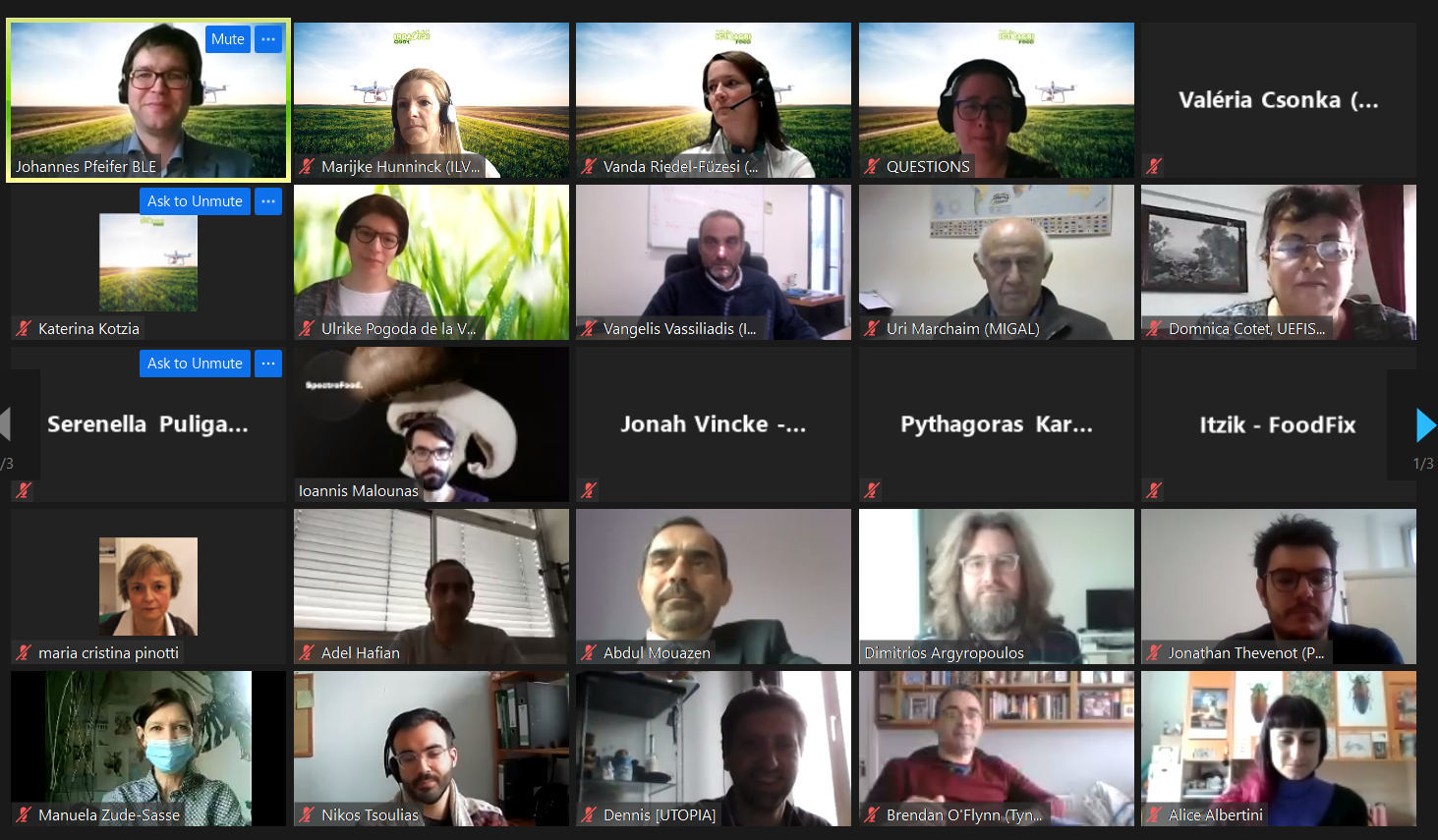
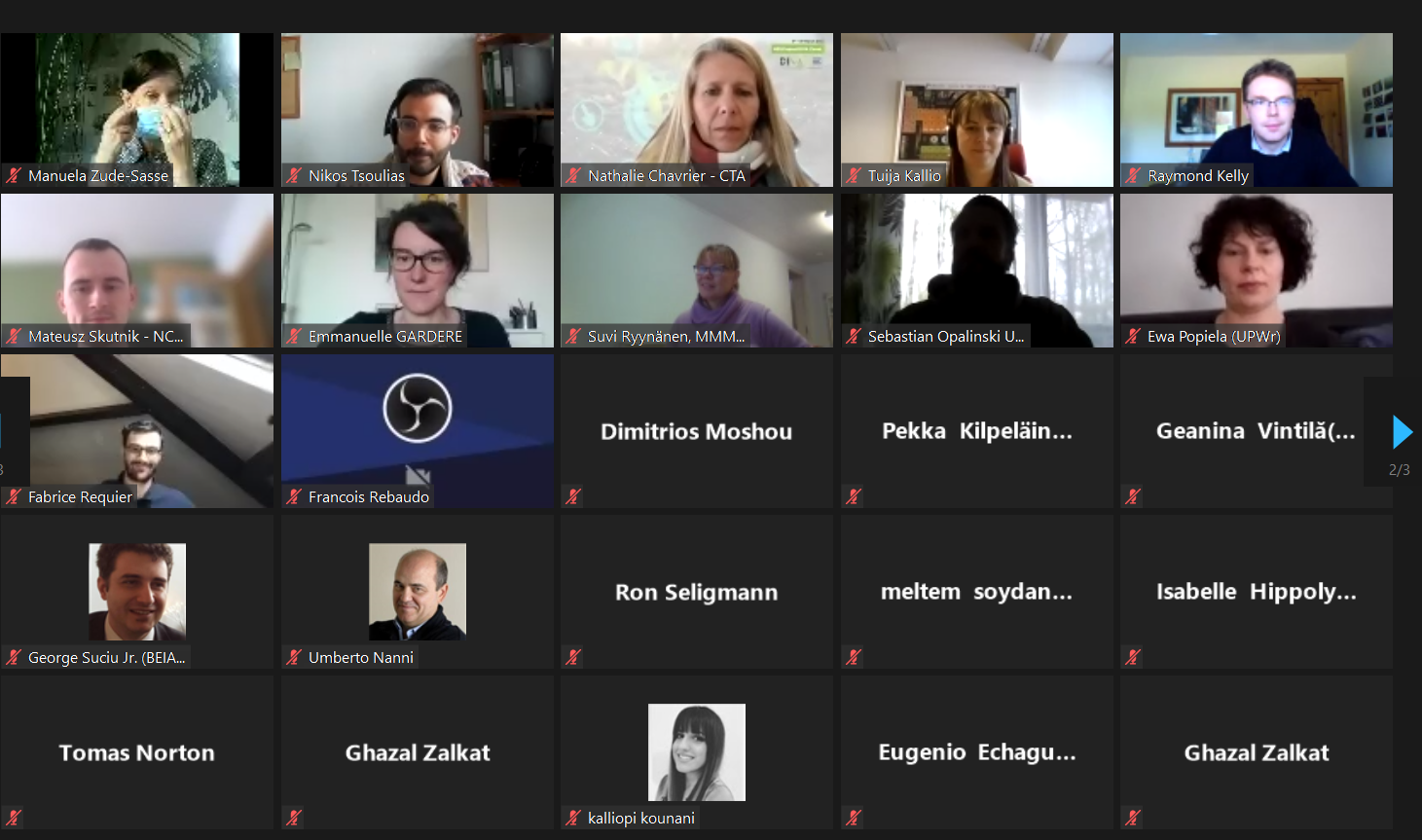
The two-day seminar was organised by the Hungarian Ministry of Agriculture (AM), the Belgian Institute for Agricultural, Fisheries and Food Research (ILVO) and the German Federal Office for Agriculture and Food (BLE) and followed the points of this Agenda.
The programme of the two days was divided between project presentations, keynote speeches and the demonstration on the monitoring and dissemination activities of the ICT-AGRI-FOOD project.
Day 1 started with a brief welcome talk and introduction from ICT-AGRI-FOOD project coordinator Johannes Pfeifer and was followed by the keynote speeches from Veerle Rijckaert from the project „Smart Sensors 4 agri-food” (SS4AF) and Christopher Brewster from Maastricht University.
Veerle Rijckaert reported about the vision and aim of SS4AF, saying that they strive for supporting all the agri-food companies to ensure they make the leap towards Industry 4.0 and that the agri-food sector evolves into an interconnected, resilient and smart agri-food system in Europe. She emphasised that the Partnership aims at contributing to the development of the Smart Specialisation Strategies of the regions involved. Presentation.
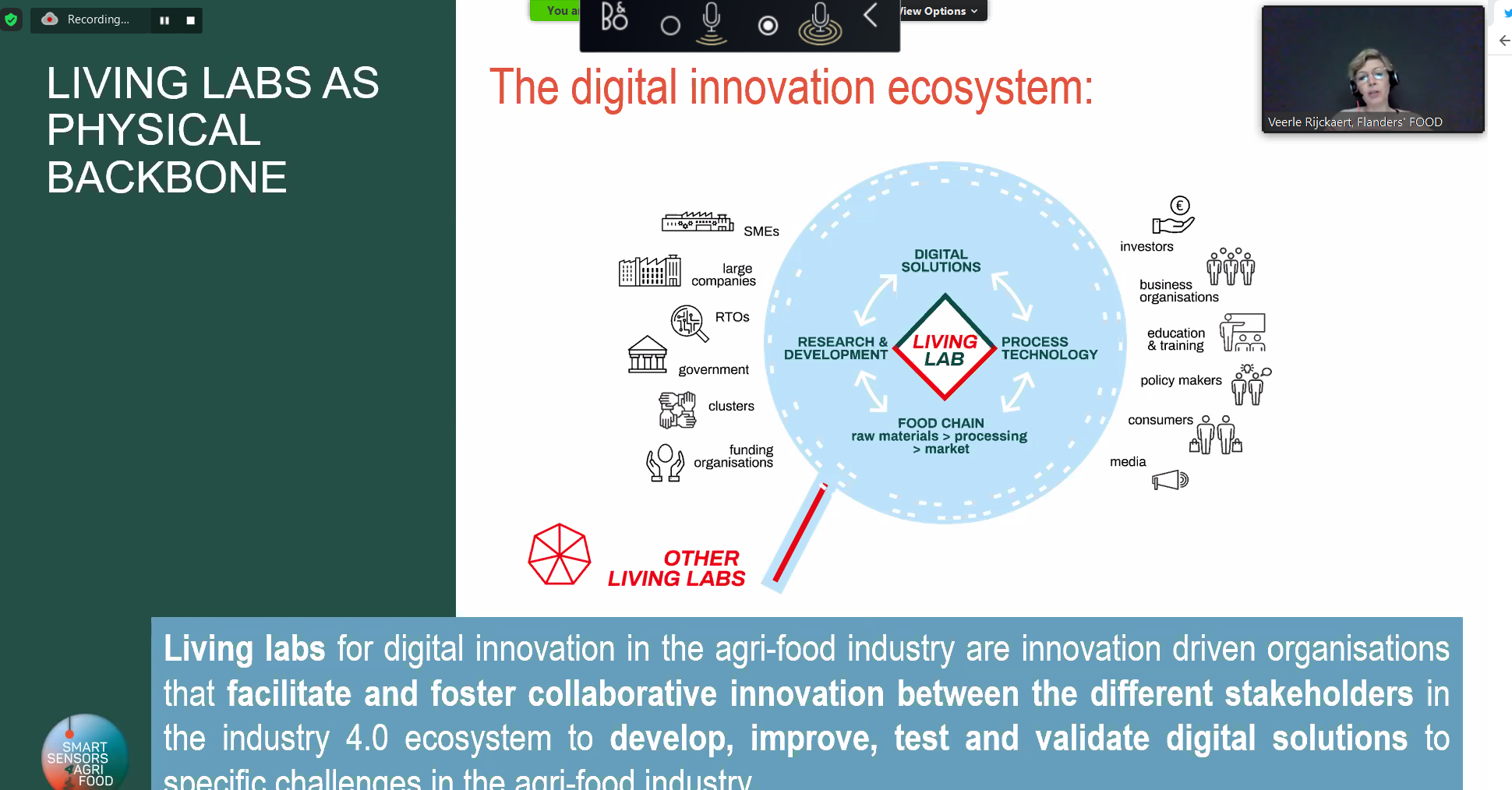
In his thought provoking lecture Christopher Brewster, main author of ICT-AGRI’s 2019 Scientific Research and innovation Agenda, shared his ideas and suggestions about the term Planetary Health. Digital agriculture he considers a controversial issue, offering tremendous potential to approach today’s challenges to the agri-food systems, but simulatneously highlighting the potential barriers and possible threats that might come up with the development of digitalisation. Presentation.
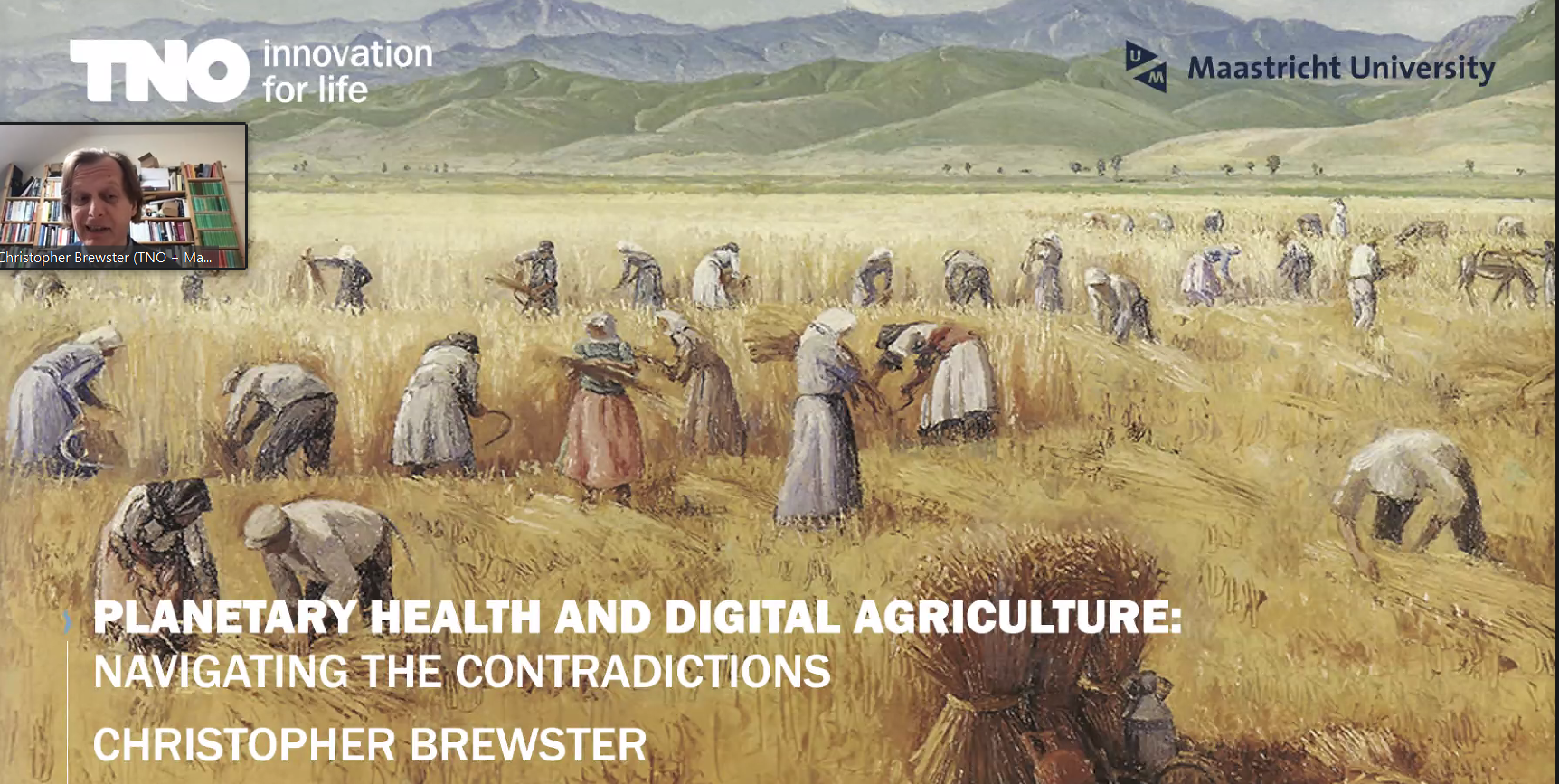
The rest of the Day 1 was reserved for the first part of the funded projects to present themselves showcasing the first steps and how each project could contribute to a more sustainable agri-food system. The presentations of the seminar were clustered in four groups: „crop production projects”, „livestock projects”, „projects with a special focus” and „projects on indoor production”. The talks focussed on a wide range of topics, from minimising tail biting in fattening pigs to site-specific fertigation, from honeybee mortality mechanisms anticipation to soil compaction risk management or disease monitoring in vineyard production, and many others. The 8 presentations of Day 1 gathered around the first two categories: „Crop production projects” and „livestock projects”.
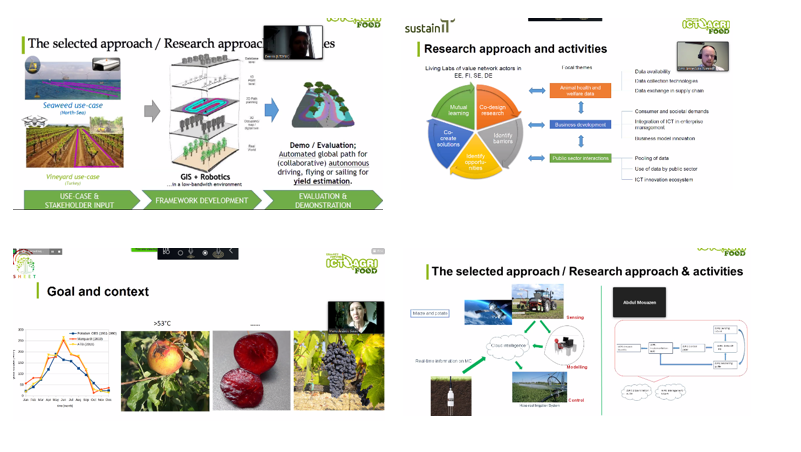
Day 2 started with the video greetings from Max Kennedy, Ministry of Business, Innovation and Employment New Zealand, who as leader of the IBF Group together with his research partners gave a talk on precision food systems.

After his talk, Ulrike Pogoda de la Vega and Marijke Hunninck in their capacity of work package leaders in ICT-AGRI-FOOD presented the monitoring and dissemination activities which are crucial tasks in the process of the project and of all other ERA-NETs as well. ICT-AGRI-FOOD_Kick-off meeting_Monitoring and communication 17032021.pdf
As next programme points on the agenda the remaining 11 projects grouped into the categories „projects with a special focus” and „projects on indoor production” were presented by the coordinators or by fellow project partners. Just as on Day 1, presenters had 10 minutes to give an overview on their projects followed by a 5 minutes Q&A section. Again, the audience had the possibility to listen to fresh and very inspiring ideas.
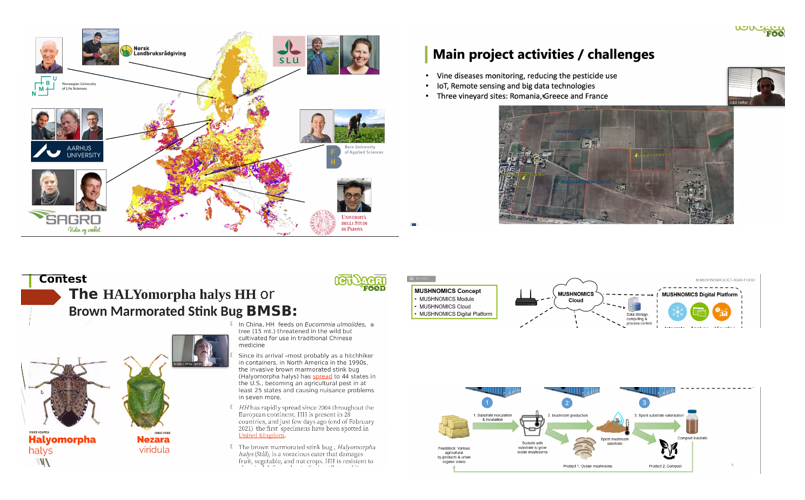
At the end of the seminar Johannes Pfeifer evaluated the two days saying that the Kick-off project seminar had a positive outcome and he had the impression that there was an ICT-AGRI-FOOD community forming and growing together – and all members of this community act in concert to realise our common vision, to transform our food systems towards the benefit of nature and environment, social and economic aspects of not only farmers or companies but all people with which we share our planet. We succeeded in talking about some of the key questions of the agri-food sector and creating more visibility for the projects.
Seminar Evaluation
The event was very successful attracting in total more than 120 registrations and around 90 attendees including the 19 project coordinators and some project partners. Members of the ICT-AGRI-FOOD project consortium were also present together with other stakeholders from the agrifood sector. After the event, participants were asked to share their opinions on the seminar.
23 participants evaluated different aspects such as content, timing, organisation and overall impressions regarding the quality of the seminar. Feedback from the attendees was positive, most of the items were evaluated as excellent and very good, especially the seminar’s content and timing, the presentation sessions and the keynote speakers.
In the followig you can read some of the responses from the survey results:
What did you like?
- Project presentations
- To have basic information of all granted projects, in a same format, classification of projects -topic, the slide with person contact of each project
- Very tidy and well organised sessions with very good moderators. The way questions and answers were very much convincing and clear, despite the limitations.
- Keynote speeches were very good! Especially the one from Christopher Brewster
- Very thorough and interesting presentations.
- Presentations
- Absolute time keeping
- The flow of presentations and time management
- Information about other projects
- I liked the idea of sending questions to a separate account
- Very good keynote speeches and always good to learn what other projects will work on.
- The Schedule and the pauses were well defined
- The atmosphere: the crew was good.
- I loved the idea, I loved the fact that everybody shared their ambition and it determined us to be even more involved in the project
- I loved the idea to organise a general Kick-off, as we can see all the other projects and get inspired by them
- Organisation, specific topics, structured presentations from all projects, excellent keynote from Christopher
- The extra information, and a better overall overview of the research in all projects. Also the connection with Knowledge Incubator (and early involvement) is appreciated. It created a sense of community, which i.m.o helps with networking and (future) cross project collaboration.
- Correct amount of time allocated for each project presentation and time for questions. Nice split of the projects into distinct categories.
What could have been better?
- All partners of a cofunded project -if they participated-could have introduced themselves
- I felt 10 min presentation was a bit short, and I have to rush sometimes.
- I don't have any specific suggestions
- more discussions
- Keynote second date
- Physical presence would be more interesting, but the sanitary conditions made it not possible
- It has been very well organised. Nothing to complain.
- I think it was quite optimal.
- Actually no suggestion
- Written questions are faster (I realise the need of a tight timing), but limit the interaction. Therefore, I would like better "oral" questions (possibly a smaller number, in order to balance timing).
- Nothing. It was perfect.
- In the online event it was easy to move out of the session in case of topics without connection to own field of interest (main groups are for sure livestock and plant production; food can be related to both depending on the product); this wouldn't be possible in a physical meeting. It is very hard for the animal commuity to listen to plant topics and vice versa.
- Possibility for break out rooms
Suggestions, comments and ideas for future events
- some exchange among participants, topic based break-out rooms
- For further event, if a physical session is allowed, a networking session could be the best way to close the seminar
- Involvement of potential stakeholders in discussion. I expected to see agricultural machinery manufacturers, sensor developers, software providers and precision agriculture service providers around the table, so that they can join some of the project as supporters, as deemed applicable.
- More questions
- Organise more focused events by topic
- More talks for new cutting edge issues and challenges
- Would be interesting to learn about successful finished projects.
- Separating livestock and plant production; one good more general keynote is interesting
- Keep them coming!
- Since the event was virtual, it would have been nice if there was a chance for networking such as break out rooms, or ways to invite someone to have a direct talk during coffee breaks or allocated networking sections.

The recordings of Day 1 and Day 2 are available. Project presentations can be found on the project pages.
The organising team would like to thank all seminar speakers and participants for their positive contributions and the collaboration along the event and for the good input on the evaluation form.
Marijke, Katrien, Valeria, Katerina, Johannes, Vanda
CALL FOR TRANSNATIONAL, COLLABORATIVE, INTER-/TRANSDISCIPLINARY RESEARCH PROJECTS ON ICT-ENABLED AGRI-FOOD SYSTEMS
The Research Project Kick-off Seminar of the “Call for transnational, collaborative, inter-/transdisciplinary research projects on ICT-enabled AGRI-FOOD systems” took place on 17-18 March 2021. Due to the pandemic situation caused by Covid-19, the event had to be organised in an online format on Zoom. Consortium partners, project leaders and researchers from different European countries participated at this event. The main purpose of the meeting was to learn about the selected projects and discuss the state of the art in the field of ICT-enabled agri-food systems.
The two-day seminar was organised by the Hungarian Ministry of Agriculture (AM), the Belgian Institute for Agricultural, Fisheries and Food Research (ILVO) and the German Federal Office for Agriculture and Food (BLE) and followed the points of this Agenda.
The programme of the two days was divided between project presentations, keynote speeches and the demonstration on the monitoring and dissemination activities of the ICT-AGRI-FOOD project.
Day 1 started with a brief welcome talk and introduction from ICT-AGRI-FOOD project coordinator Johannes Pfeifer and was followed by the keynote speeches from Veerle Rijckaert from the project „Smart Sensors 4 agri-food” (SS4AF) and Christopher Brewster from Maastricht University.
Veerle Rijckaert reported about the vision and aim of SS4AF, saying that they strive for supporting all the agri-food companies to ensure they make the leap towards Industry 4.0 and that the agri-food sector evolves into an interconnected, resilient and smart agri-food system in Europe. She emphasised that the Partnership aims at contributing to the development of the Smart Specialisation Strategies of the regions involved. Presentation.
In his thought provoking lecture Christopher Brewster, main author of ICT-AGRI’s 2019 Scientific Research and innovation Agenda, shared his ideas and suggestions about the term Planetary Health. Digital agriculture he considers a controversial issue, offering tremendous potential to approach today’s challenges to the agri-food systems, but simulatneously highlighting the potential barriers and possible threats that might come up with the development of digitalisation. Presentation.
The rest of the Day 1 was reserved for the first part of the funded projects to present themselves showcasing the first steps and how each project could contribute to a more sustainable agri-food system. The presentations of the seminar were clustered in four groups: „crop production projects”, „livestock projects”, „projects with a special focus” and „projects on indoor production”. The talks focussed on a wide range of topics, from minimising tail biting in fattening pigs to site-specific fertigation, from honeybee mortality mechanisms anticipation to soil compaction risk management or disease monitoring in vineyard production, and many others. The 8 presentations of Day 1 gathered around the first two categories: „Crop production projects” and „livestock projects”.
Day 2 started with the video greetings from Max Kennedy, Ministry of Business, Innovation and Employment New Zealand, who as leader of the IBF Group together with his research partners gave a talk on precision food systems.
After his talk, Ulrike Pogoda de la Vega and Marijke Hunninck in their capacity of work package leaders in ICT-AGRI-FOOD presented the monitoring and dissemination activities which are crucial tasks in the process of the project and of all other ERA-NETs as well. ICT-AGRI-FOOD_Kick-off meeting_Monitoring and communication 17032021.pdf
As next programme points on the agenda the remaining 11 projects grouped into the categories „projects with a special focus” and „projects on indoor production” were presented by the coordinators or by fellow project partners. Just as on Day 1, presenters had 10 minutes to give an overview on their projects followed by a 5 minutes Q&A section. Again, the audience had the possibility to listen to fresh and very inspiring ideas.
At the end of the seminar Johannes Pfeifer evaluated the two days saying that the Kick-off project seminar had a positive outcome and he had the impression that there was an ICT-AGRI-FOOD community forming and growing together – and all members of this community act in concert to realise our common vision, to transform our food systems towards the benefit of nature and environment, social and economic aspects of not only farmers or companies but all people with which we share our planet. We succeeded in talking about some of the key questions of the agri-food sector and creating more visibility for the projects.
Seminar Evaluation
The event was very successful attracting in total more than 120 registrations and around 90 attendees including the 19 project coordinators and some project partners. Members of the ICT-AGRI-FOOD project consortium were also present together with other stakeholders from the agrifood sector. After the event, participants were asked to share their opinions on the seminar.
23 participants evaluated different aspects such as content, timing, organisation and overall impressions regarding the quality of the seminar. Feedback from the attendees was positive, most of the items were evaluated as excellent and very good, especially the seminar’s content and timing, the presentation sessions and the keynote speakers.
In the followig you can read some of the responses from the survey results:
What did you like?
What could have been better?
Suggestions, comments and ideas for future events
The recordings of Day 1 and Day 2 are available. Project presentations can be found on the project pages.
The organising team would like to thank all seminar speakers and participants for their positive contributions and the collaboration along the event and for the good input on the evaluation form.
Marijke, Katrien, Valeria, Katerina, Johannes, Vanda